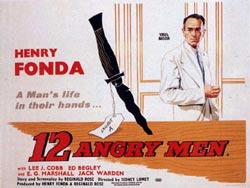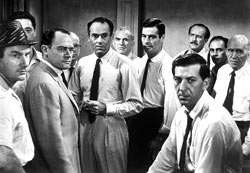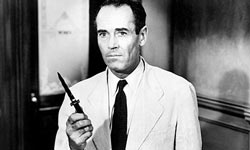
So when a story comes along with almost no action, no hold-your-breath twists, and none of the characters even have names…it isn’t a thriller, is it? Is it?
The 1957 film 12 Angry Men, with a screenplay by Reginald Rose based on his teleplay of a few years earlier, is, in reality, one of the most brilliant thrillers ever to hit the screen. No car chases, nothing blown up, no gunshots. Most of the film takes place in one admittedly drab setting—a jury room.


The story is well-known. One by one the other jurors change their votes. Eyewitness accounts are called into question. Racism and age discrimination show themselves. The tension is a living, breathing thing—twelve men of different backgrounds, with different inner stories, called to sit in judgment. The day is murderously hot. The tempers flare, alliances form, then shift. The very ground underneath these men seems to be moving, all undergirded by Fonda’s soft-spoken sensibilities and Cobb’s bombast.
Soon, with revelations about murder weapons, the veracity of the witnesses, the character of the accused, the roles are reversed. Cobb stands alone as a guilty vote, before breaking into tears, ripping apart a picture of himself and his own son—from whom he has been estranged for two years—and crying, “Not guilty, not guilty!”
The men call for the bailiff. One by one they file out of the room. The last two left on camera are Fonda and Cobb. In a moment of poignancy rarely matched on film, Fonda helps Cobb on with his jacket. The only two of the jurors to have stood alone—Fonda in the beginning, Cobb at the end—file silently out. The next shot is on the courthouse steps as the men leave. Juror #9 (Sweeney) seeks out Juror #8 (Fonda), and they exchange names—the only characters named in the film, seconds before the credits roll.
It has all the ingredients of a classic thriller. But the suspense is psychological and character-driven—even without knowing the characters’ names. The story is told via dialogue only. The thrill is the race to judge the defendant, the high stakes—the electric chair—that hangs over all, and the way the characters not only face their own stories and prejudices, but eventually change their thinking. They all have heroes’ journeys, made possible by a brilliant cast and Sidney Lumet’s sure directorial hand.
12 Angry Men is an American cinematic classic, a thriller with no action, a story of riveting suspense and revelation. It has inspired at least two remakes, plus a highly successful stage play. Watch the 1957 film version—it is a study in storytelling and a different twist on the art of crime fiction.
B. Kent Anderson’s new novel, Cold Glory, a Civil War-inspired contemporary thriller, will be published by Forge in October of 2011.

Definitely in my top ten movies of all time. It’s so good, I’ve even seen it capture the attention of a 14-year-old despite the fact that it’s in black-and-white and nothing explodes.
Leslie, the same thing happened at my house. My 17- and 13-year-old sons were mesmerized by it when we watched it recently. They couldn’t look away. That cemented my decision to write about it.
Thanks for your comment.
This is really a great movie.
I’m not sure whether this is available outside of Japan, but the play / movie [url=http://www.imdb.com/title/tt0104330/]Juuninin no Yasashii Nihonjin[/url] (“12 Gentle Japanese“) by Mitani Kouki is a wonderful parody on 12 Angry Men, with one man trying to convince the others the defendant is indeed guilty!